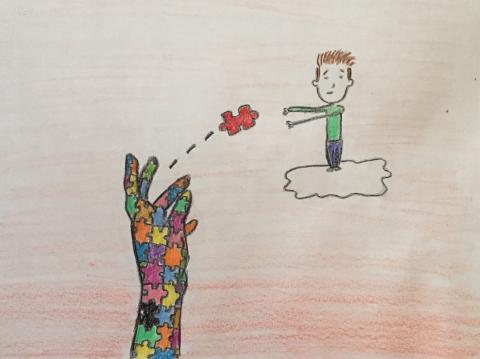March 21, 2016 - 17:27


“In virtually all my interviews, guilt was the elephant in the room [. . .] 'Bad conscience' can become ‘torture without end,’ undoing any prospects for happiness” (Sherman 2010).
Thinking on guilt as it relates to trauma in the classroom, my first mental move was to break down what I consider guilt to be: the internal privileging of what one has deemed their wrongdoings or “bad” parts over the good—even if only for a moment. Surely, there are times when guilt is important, and it alerts us to when we should take actions (apologizing or making up for something)—and then, sometimes, there is nothing to be done except move forward. Thinking about guilt as an emotional burden that someone with trauma lives with longterm, how can educators create an environment that might ease that burden for learners?
I am, as always, brought back to the 360 Program, perhaps because I consider it to be such a community space where learning and emotional lives intermingle in powerful and productive ways. The 360s in which I have participated allow students to simultaneously exercise and exhibit multiple parts of themselves (as theoretical scholars, as people with multiple, intersecting identities and personal stories, and even as artists). Coming into the classroom bringing parts of ourselves that are not so often valued in school allows others to see us people with *complex personhood*—and by extension, allow us to see ourselves that way.
When we see so many parts of ourselves at once, we must find some goodness, it seems, and with the recognition of that goodness may come some forgiveness—it also may allow us to see that the parts of ourselves of which we are less proud can and do coexist with our goodness, that this paradox is part of our humanity. Ultimately, it seems, 360 clusters all us to see that we need not necessarily abandon our disappointment in ourselves in order to accept and respect ourselves.
Last semester, learning about the experiences of women in women’s prisons who participate in book groups, I found that this entire perspective comes with a great deal of privilege. We read many accounts of women for whom it was remarkably important to define themselves as a new person—distinct from the people they were before their prison sentence.
“That self-judgment and sense of responsibility, even guilt, may even be redemptive, a way of reconnecting with one’s full humanity. The soldiers I spoke with longed for a way to feel whole, even if at the cost of their profound and acute feelings of guilt” (Sherman 2010).
I am, of course, in no position to interrogate this need, and know that the experiences I bring to bear to the conversation do not have the same gravity (I have never had to question whether my entire life path--and resultantly, identity--should have to change in order for me to move forward).
